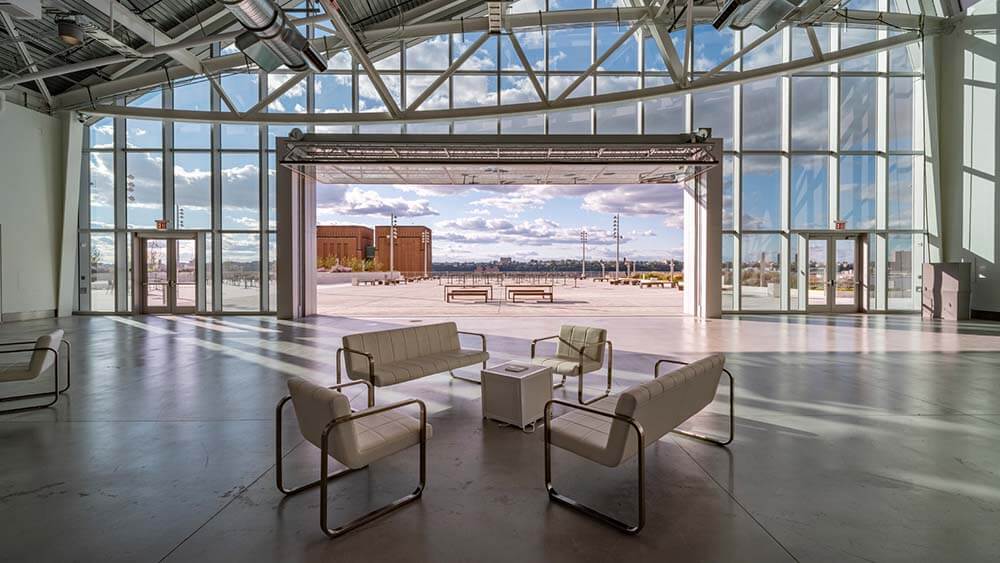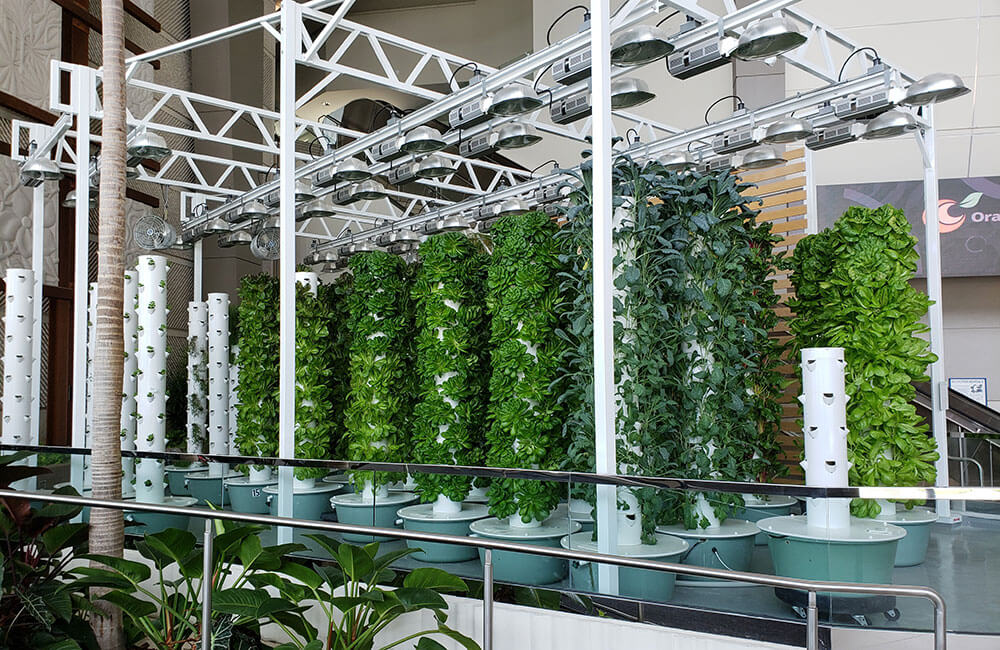
The flexible Pavilion indoor event space at the Javits Center in New York City opens onto an outdoor terrace. (Courtesy of Javits Center)
Throughout the pandemic, many of our lifestyles, priorities, and ways of working have dramatically changed. In its report “The Future 100: 2022,” creative agency, consultancy, and technology company Wunderman Thompson has identified 100 trends across industries — from culture to health to travel and hospitality — that will shape the way we live and work this year and beyond. The Convene editors have each chosen three trends from Wunderman Thompson’s report and connected them to meetings and events. Digital Editor Curt Wagner takes on rewilding the office, foraged cocktails, and metawork.
Rewilding the Office
Studies show that experiencing nature can help boost our attention, creativity, and focus, which makes this trend of the “outdoor-ification” of offices a no-brainer as companies ask their employees to return to the workplace.
This practice of connecting people to the outdoors through the design of spaces is called biophilic design. Wunderman Thompson offers several examples of the trend, including the installation of beehives on a terrace at investment company Nuveen’s midtown Manhattan headquarters and an office at the Springdale Green development in Austin, Texas, that is “more outside than inside,” according to The New York Times. Convene previously reported about a Second Home co-working and meeting space in Los Angeles that includes 6,500 trees and plants in what was once a parking lot.
Convention centers and hotels started exploring how they could bring the outdoors in years ago with greenery-covered living walls, natural materials such as wood and stone, meeting rooms flooded with natural light, and flexible indoor/outdoor spaces overlooking natural elements like rivers or the ocean. But that practice has accelerated during the pandemic, architect Michael Lockwood told Convene. “It’s amazing how COVID-19 has started to highlight how [flexible spaces] are a great opportunity to spread people out, to connect them in a more inclusive way — on their own terms and where they feel most comfortable,” said Lockwood, head of the convention center practice at Kansas City–based architecture firm Populous.

Attendees can see where their food comes from “when they walk in the door” of Orlando’s Orange County Convention Center.
Foraged Cocktails
Who knew foraging is part of the Swedish identity? Not I, but apparently we can thank Sweden for this trend. In 2021, Visit Sweden followed up its tourism programs Edible Country and Drinkable Country with the Taste of Swedish Summer campaign that highlights 22 natural ingredients that can be foraged in Sweden during the summer. The site offers food preservation methods such as pickling and fermentation, and innovative recipes.
While Wunderman Thompson’s trend talks mostly about foraged cocktails, the idea behind it — that local and sustainable ingredients minimize waste, cut shipping costs, and make meals fresher — has found support among convention center and hotel chefs and operations staff.
And event venues are reporting that attendees are becoming more interested in where the food they eat at events comes from. Molly Crouch, director of sustainability at Sodexo Live!, the exclusive F&B provider for Orlando’s Orange County Convention Center (OCCC), said she has noticed that, among the 130-plus groups the OCCC has hosted since July 2020, there is more of an interest in healthy, local items on menus.
“What’s come out of it is — ‘I want local. I want to meet the farmer. I want to be there when the food is prepared, I want to be there when it’s picked and when it’s brought to the kitchen and when the chef starts to use it,’” Crouch told Convene.
The OCCC has been preparing for this demand since 2016, when it launched a vertical farm with 88 towers that now produce up to 7,000 plants a year to be used in event menus. The rooftop Farm at the Javits Center in New York City will grow 40 different crops and 40,000 pounds of produce annually that will be incorporated into meals served on site. The hydroponic “Smart Farm” at the Greater Columbus Convention Center grows fresh vegetables and herbs under lights that mimic the sun. The JW Marriott has planted edible gardens at 25 of its properties and plans to continue at all its hotels.
These examples aren’t quite “foraging,” but the same principle — locally sourced ingredients — applies.
Metawork
One major change in how we work caused by the pandemic has been the shift to remote and hybrid work — and the new ways we work are likely here to stay.
According to Wunderman Thompson, we won’t all be stuck communicating via Zoom chats and instant messaging. With virtual offices that use mixed reality, you could be collaborating side by side with a team member who lives on the other side of the country — or world.
Microsoft’s Mesh for Microsoft Teams, expected sometime this year, enables people to attend meetings as customized avatars and collaborate on projects through shared holographic experiences. Holograms, as Convene has reported, are becoming a more popular way to present keynote speakers at events, much like PCMA did at Convening Leaders 2022 in January.
Another available technology, Meta’s Horizon Workrooms, allows coworkers to collaborate and create together in the same virtual workspace using Quest 2 hardware that includes a headset and hand-held controllers. Remote teams can work together on the same virtual whiteboard, sketching out plans or brainstorming ideas.
Perhaps it’s a bit of a stretch to imagine meeting venues that are mapped out and recreated in a virtual environment that busy event planners could “step into” for a remote site visit. It could save time, money, and — this is no stretch — frayed nerves from traveling.
Update: Now RendezVerse, from London-based Worldwide Events, is developing “digital twins” – virtual, three-dimensional replicas – of his hotel and conference centers that will eventually live in the metaverse. The first phase are meeting venues that are mapped out and recreated in a virtual environment that busy event planners could “step into” for a remote site visit.
Curt Wagner is digital editor of Convene.
